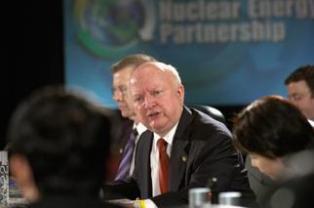Senior energy officials from some of the world's leading economies issued a joint statement in support of the Global Nuclear Energy Partnership (GNEP) and nuclear energy cooperation.
 Officials from China, France, Japan, Russia and the USA issued the statement after a ministerial meeting in Washington, DC, on 21 May. The UK and the International Atomic Energy Agency (IAEA) participated in the meeting as observers. The statement addresses the prospects for international cooperation in peaceful uses of nuclear energy, including technical aspects, especially in the framework of GNEP.
Officials from China, France, Japan, Russia and the USA issued the statement after a ministerial meeting in Washington, DC, on 21 May. The UK and the International Atomic Energy Agency (IAEA) participated in the meeting as observers. The statement addresses the prospects for international cooperation in peaceful uses of nuclear energy, including technical aspects, especially in the framework of GNEP.
The statement said: "The participants believe in order to implement the GNEP without prejudice to other corresponding initiatives, a number of near- and long-term technical challenges must be met. They include development of advanced, more proliferation resistant fuel cycle approaches and reactor technologies that will preserve existing international market regulations."
It continued, "The participants recognized that national priorities, legislation and capabilities result in each country having unique nuclear energy needs and challenges and that a variety of approaches and technical pathways may be necessary to achieve their long-term goals. The participants share a common view that a long-term vision of the global nuclear fuel cycle cannot be achieved without broader cooperation and partnerships involving nations that currently utilize, or are planning to develop, civilian nuclear energy."
In addition to providing overviews on each country's national and international nuclear energy policies in relation to GNEP, senior officials also discussed topics considered crucial to GNEP's development. The topics included: infrastructure development needs for countries considering nuclear power; development of advanced fuel cycle and safeguards technology; establishment of reliable fuel services; used nuclear fuel management; and building the partnership and next steps to pursue this major global initiative.
"Today's Joint Statement officially puts the 'P' in the Global Nuclear Energy 'Partnership,'" US Secretary of Energy Samuel W. Bodman said. "For Americans, pursuing nuclear power is wise policy; for industry it can be good business; internationally, it is unmatched in its ability to serve as a cornerstone of sustainable economic development, while offering enormous potential to satisfy the world's increasing demand for energy in a clean, safe and proliferation-resistant manner."
GNEP, first announced by President George Bush in 2006, is part of his Advanced Energy Initiative. It seeks to develop worldwide consensus on enabling expanded use of nuclear energy to meet growing electricity demand. This will use a nuclear fuel cycle that enhances energy security, while promoting non-proliferation. It would achieve its goal by having countries with secure, advanced nuclear capabilities provide fuel services - fresh fuel and recovery of used fuel - to other countries who agree to employ nuclear energy for power generation purposes only. The closed fuel cycle model envisioned by this partnership requires development and deployment of technologies that enable recycling and consumption of long-lived radioactive waste. GNEP includes key research and technology development programs as well as international policy cooperation.
Further information
GNEP website
WNA's Cooperation in the Nuclear Power Industry information paper
WNN: Funding for GNEP studies announcedWNN: JNFL joins GNEP consortium




_28178.jpg)
_66891.jpg)
_30199.jpg)
_72306.jpg)





